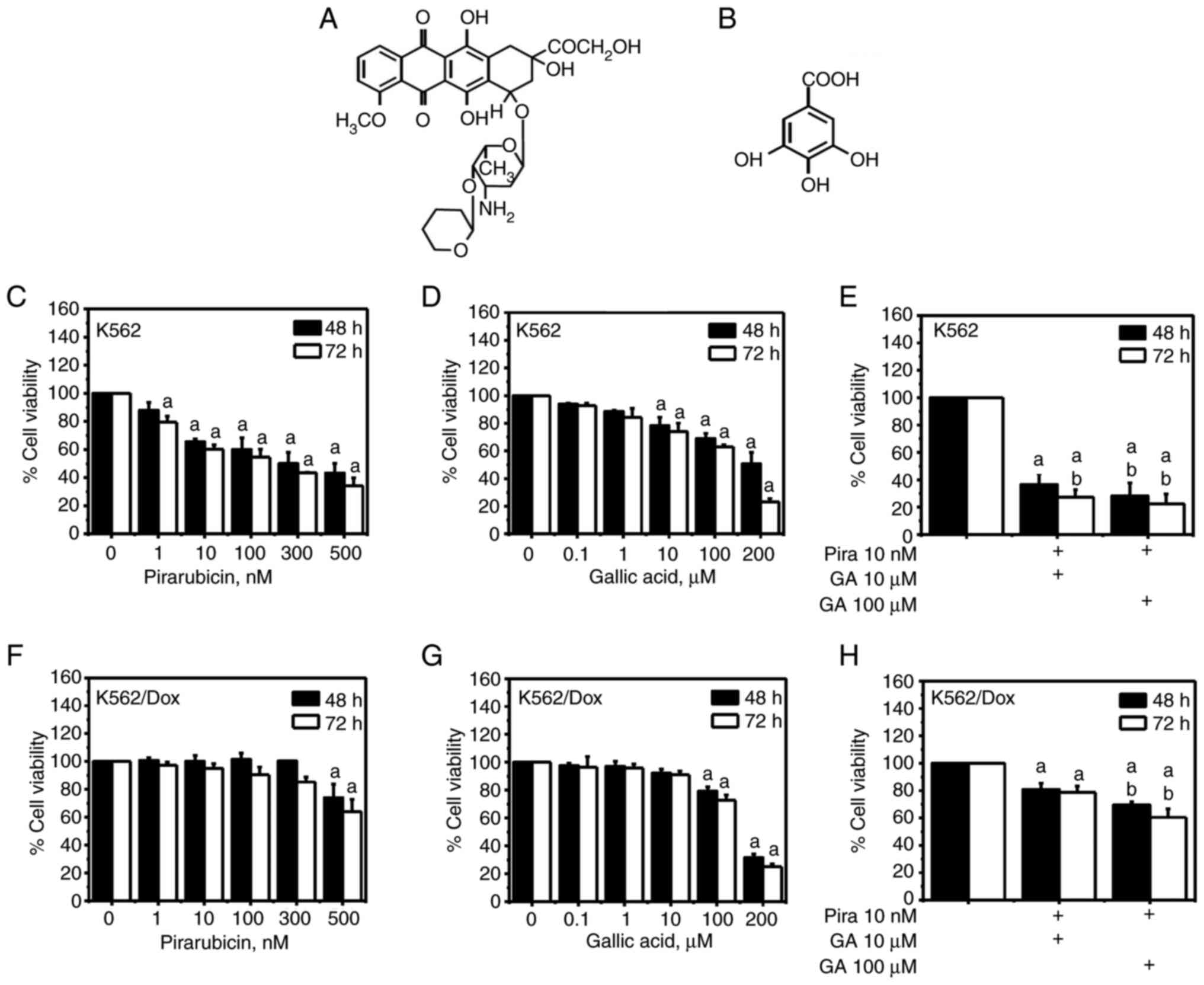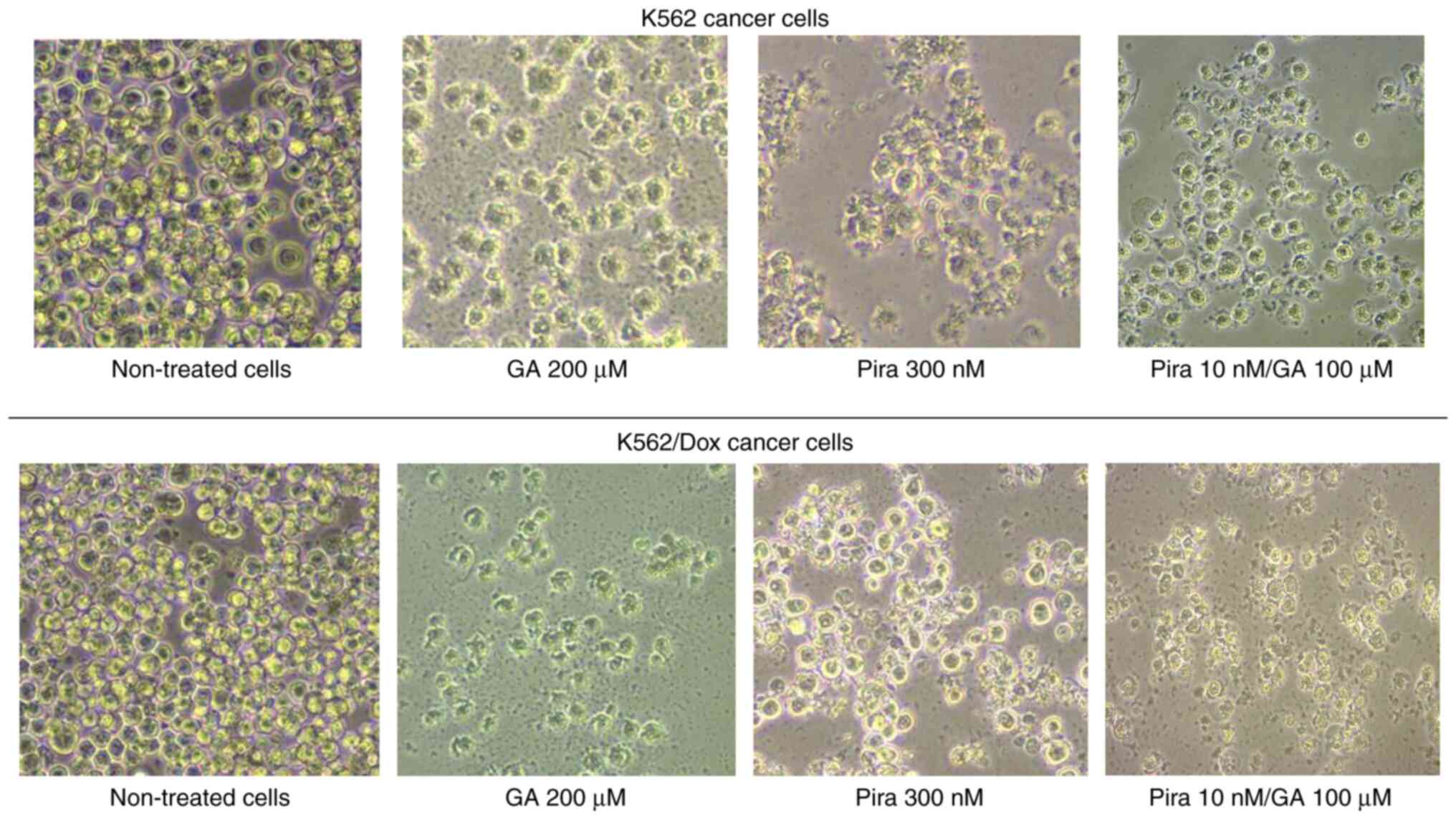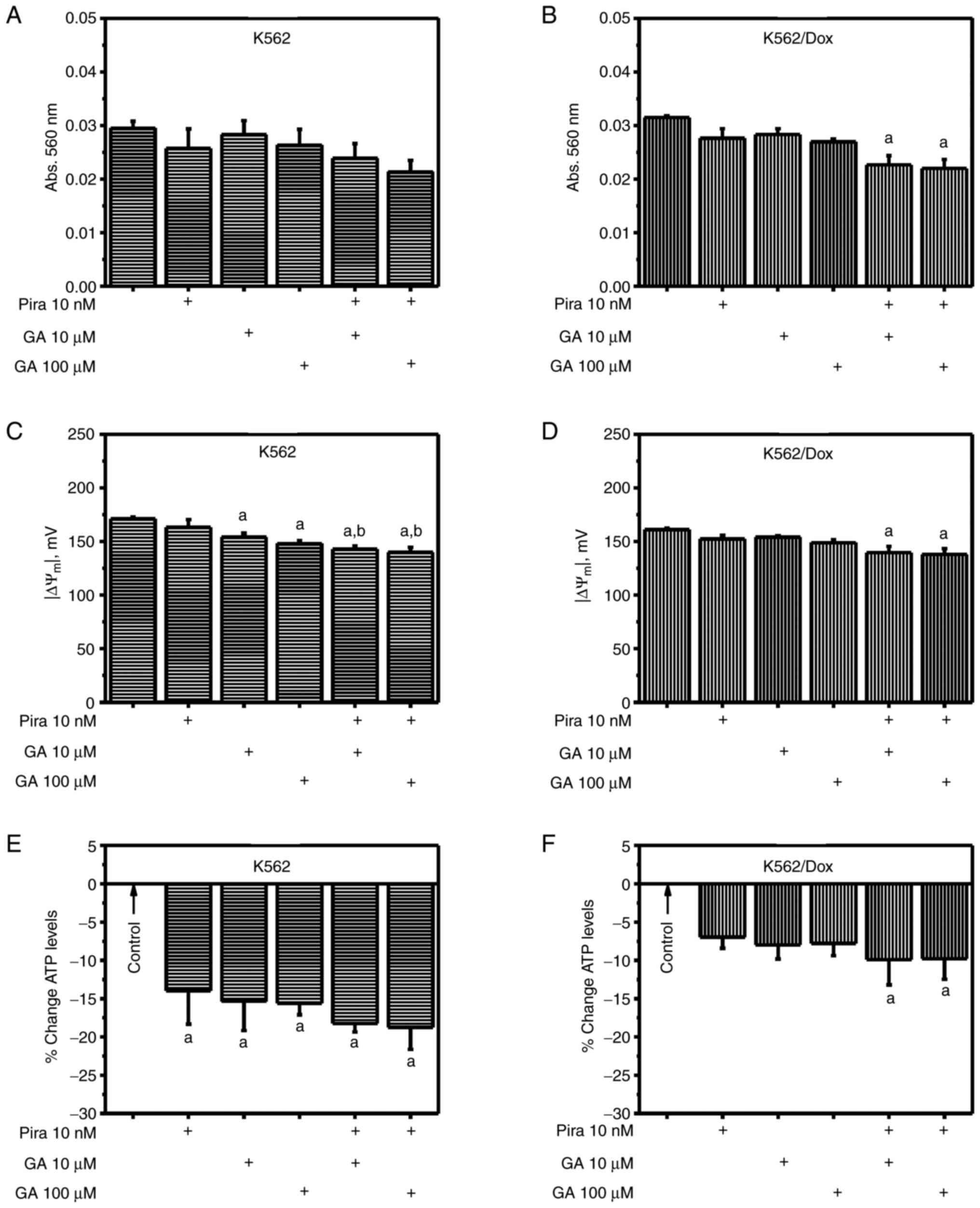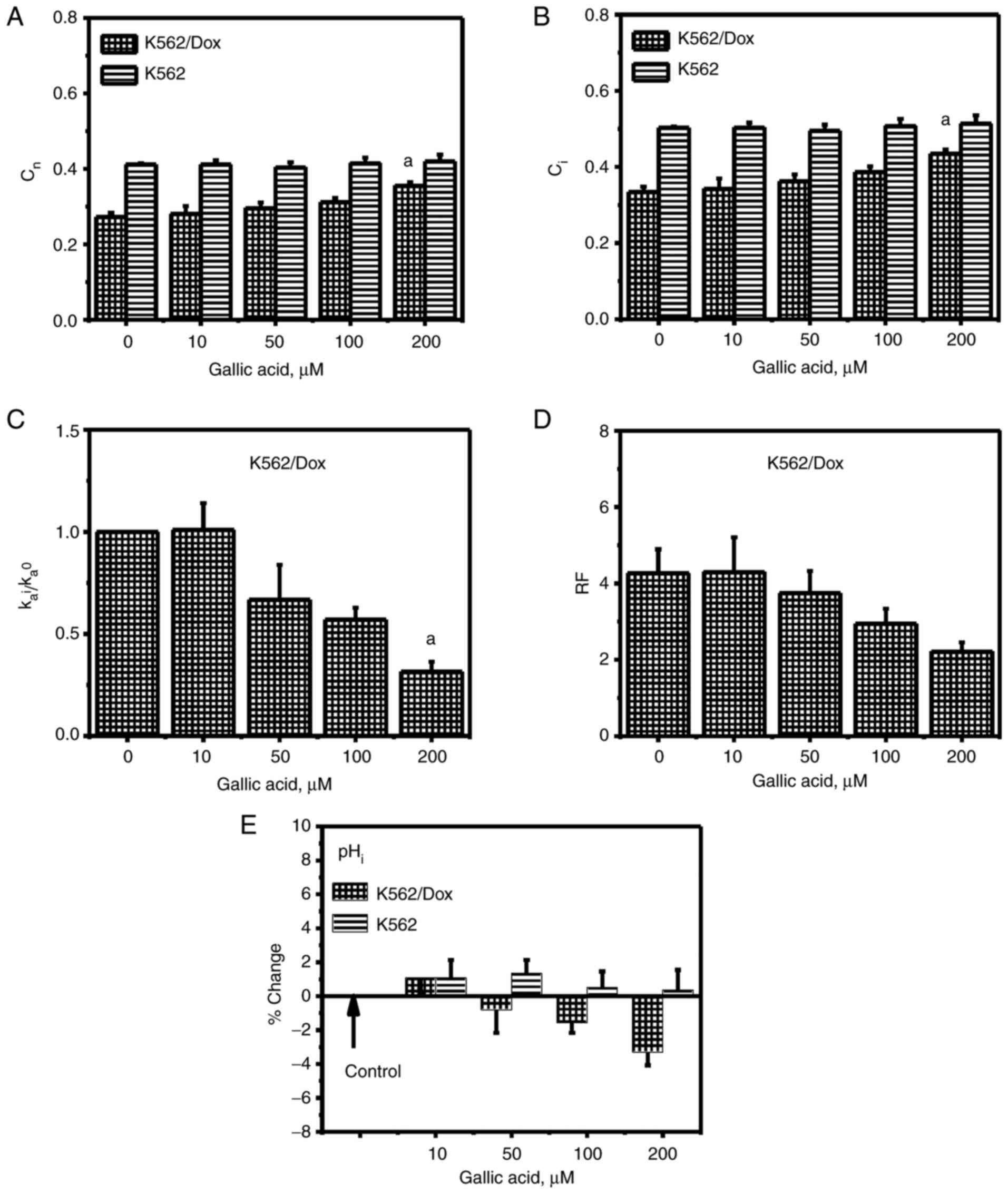|
1
|
Bray F, Ferlay J, Soerjomataram I, Siegel
RL, Torre LA and Jemal A: Global cancer statistics 2018: GLOBOCAN
estimates of incidence and mortality worldwide for 36 cancers in
185 countries. CA Cancer J Clin. 68:394–424. 2018. View Article : Google Scholar : PubMed/NCBI
|
|
2
|
Gewirtz DA: A critical evaluation of the
mechanisms of action proposed for the antitumor effects of the
anthracycline antibiotics adriamycin and daunorubicin. Biochem
Pharmacol. 57:727–741. 1999. View Article : Google Scholar : PubMed/NCBI
|
|
3
|
Minotti G, Menna P, Salvatorelli E, Cairo
G and Gianni L: Anthracyclines: Molecular advances and
pharmacologic developments in antitumor activity and
cardiotoxicity. Pharmacol Rev. 56:185–229. 2004. View Article : Google Scholar : PubMed/NCBI
|
|
4
|
Meredith AM and Dass CR: Increasing role
of the cancer chemotherapeutic doxorubicin in cellular metabolism.
J Pharm Pharmacol. 68:729–741. 2016. View Article : Google Scholar : PubMed/NCBI
|
|
5
|
Miller AA and Salewski E: Prospects for
pirarubicin. Med Pediatr Oncol. 22:261–268. 1994. View Article : Google Scholar : PubMed/NCBI
|
|
6
|
Tsuruo T, Iida H, Tsukagoshi S and Sakurai
Y: 4′-O-tetrahydropyranyladriamycin as a potential new antitumor
agent. Cancer Res. 42:1462–1467. 1982.PubMed/NCBI
|
|
7
|
Kunimoto S, Miura K, Takahashi Y, Takeuchi
T and Umezawa H: Rapid uptake by cultured tumor cells and
intracellular behavior of 4′-O-tetrahydropyranyladriamycin. J
Antibiot (Tokyo). 36:312–317. 1983. View Article : Google Scholar : PubMed/NCBI
|
|
8
|
Mizutani H, Hotta S, Nishimoto A, Ikemura
K, Miyazawa D, Ikeda Y, Maeda T, Yoshikawa M, Hiraku Y and
Kawanishi S: Pirarubicin, an anthracycline anticancer agent,
induces apoptosis through generation of hydrogen peroxide.
Anticancer Res. 37:6063–6069. 2017.PubMed/NCBI
|
|
9
|
Michieli M, Damiani D, Michelutti A,
Candoni A, Masolini P, Scaggiante B, Quadrifoglio F and Baccarani
M: Restoring uptake and retention of daunorubicin and idarubicin in
P170-related multidrug resistance cells by low concentration
D-verapamil, cyclosporin-A and SDZ PSC 833. Haematologica.
79:500–507. 1994.PubMed/NCBI
|
|
10
|
Xia Q, Wang ZY, Li HQ, Diao YT, Li XL, Cui
J, Chen XL and Li H: Reversion of p-glycoprotein-mediated multidrug
resistance in human leukemic cell line by diallyl trisulfide. Evid
Based Complement Alternat Med. 2012:7198052012. View Article : Google Scholar : PubMed/NCBI
|
|
11
|
Barrand MA, Bagrij T and Neo SY: Multidrug
resistance-associated protein: A protein distinct from
P-glycoprotein involved in cytotoxic drug expulsion. Gen Pharmacol.
28:639–645. 1997. View Article : Google Scholar : PubMed/NCBI
|
|
12
|
Choi CH: ABC transporters as multidrug
resistance mechanisms and the development of chemosensitizers for
their reversal. Cancer Cell Int. 5:302005. View Article : Google Scholar : PubMed/NCBI
|
|
13
|
Yang K, Wu J and Li X: Recent advances in
the research of P-glycoprotein inhibitors. Biosci Trends.
2:137–146. 2008.PubMed/NCBI
|
|
14
|
Inaba M, Fujikura R, Tsukagoshi S and
Sakurai Y: Restored in vitro sensitivity of adriamycin- and
vincristine-resistant P388 leukemia with reserpine. Biochem
Pharmacol. 30:2191–2194. 1981. View Article : Google Scholar : PubMed/NCBI
|
|
15
|
Mocanu MM, Nagy P and Szöllősi J:
Chemoprevention of breast cancer by dietary polyphenols. Molecules.
20:22578–22620. 2015. View Article : Google Scholar : PubMed/NCBI
|
|
16
|
Punia R, Raina K, Agarwal R and Singh RP:
Acacetin enhances the therapeutic efficacy of doxorubicin in
non-small-cell lung carcinoma cells. PLoS One. 12:e01828702017.
View Article : Google Scholar : PubMed/NCBI
|
|
17
|
Liu R, Ji P, Liu B, Qiao H, Wang X, Zhou
L, Deng T and Ba Y: Apigenin enhances the cisplatin cytotoxic
effect through p53-modulated apoptosis. Oncol Lett. 13:1024–1030.
2017. View Article : Google Scholar : PubMed/NCBI
|
|
18
|
Bansal T, Jaggi M, Khar RK and Talegaonkar
S: Emerging significance of flavonoids as P-glycoprotein inhibitors
in cancer chemotherapy. J Pharm Pharm Sci. 12:46–78. 2009.
View Article : Google Scholar : PubMed/NCBI
|
|
19
|
Naus PJ, Henson R, Bleeker G, Wehbe H,
Meng F and Patel T: Tannic acid synergizes the cytotoxicity of
chemotherapeutic drugs in human cholangiocarcinoma by modulating
drug efflux pathways. J Hepatol. 46:222–229. 2007. View Article : Google Scholar : PubMed/NCBI
|
|
20
|
Muhammad N, Steele R, Isbell TS, Philips N
and Ray RB: Bitter melon extract inhibits breast cancer growth in
preclinical model by inducing autophagic cell death. Oncotarget.
8:66226–66236. 2017. View Article : Google Scholar : PubMed/NCBI
|
|
21
|
Haslam E and Cai Y: Plant polyphenols
(vegetable tannins): Gallic acid metabolism. Nat Prod Rep.
11:41–66. 1994. View Article : Google Scholar : PubMed/NCBI
|
|
22
|
Zhao B and Hu M: Gallic acid reduces cell
viability, proliferation, invasion and angiogenesis in human
cervical cancer cells. Oncol Lett. 6:1749–1755. 2013. View Article : Google Scholar : PubMed/NCBI
|
|
23
|
Locatelli C, Filippin-Monteiro FB and
Creczynski-Pasa TB: Alkyl esters of gallic acid as anticancer
agents: A review. Eur J Med Chem. 60:233–239. 2013. View Article : Google Scholar : PubMed/NCBI
|
|
24
|
Priscilla DH and Prince PS:
Cardioprotective effect of gallic acid on cardiac troponin-T,
cardiac marker enzymes, lipid peroxidation products and
antioxidants in experimentally induced myocardial infarction in
Wistar rats. Chem Biol Interact. 179:118–124. 2009. View Article : Google Scholar : PubMed/NCBI
|
|
25
|
Lu Z, Nie G, Belton PS, Tang H and Zhao B:
Structure-activity relationship analysis of antioxidant ability and
neuroprotective effect of gallic acid derivatives. Neurochem Int.
48:263–274. 2006. View Article : Google Scholar : PubMed/NCBI
|
|
26
|
Omóbòwálé TO, Oyagbemi AA, Folasire AM,
Ajibade TO, Asenuga ER, Adejumobi OA, Ola-Davies OE, Oyetola O,
James G, Adedapo AA and Yakubu MA: Ameliorative effect of gallic
acid on doxorubicin-induced cardiac dysfunction in rats. J Basic
Clin Physiol Pharmacol. 29:19–27. 2018. View Article : Google Scholar : PubMed/NCBI
|
|
27
|
Kim SH, Jun CD, Suk K, Choi BJ, Lim H,
Park S, Lee SH, Shin HY, Kim DK and Shin TY: Gallic acid inhibits
histamine release and pro-inflammatory cytokine production in mast
cells. Toxicol Sci. 91:123–131. 2006. View Article : Google Scholar : PubMed/NCBI
|
|
28
|
Punithavathi VR, Prince PS, Kumar R and
Selvakumari J: Antihyperglycaemic, antilipid peroxidative and
antioxidant effects of gallic acid on streptozotocin induced
diabetic Wistar rats. Eur J Pharmacol. 650:465–471. 2011.
View Article : Google Scholar : PubMed/NCBI
|
|
29
|
Oyagbemi AA, Omobowale TO, Saba AB, Olowu
ER, Dada RO and Akinrinde AS: Gallic acid ameliorates
cyclophosphamide-induced neurotoxicity in wistar rats through free
radical scavenging activity and improvement in antioxidant defense
system. J Diet Suppl. 13:402–419. 2016. View Article : Google Scholar : PubMed/NCBI
|
|
30
|
Supawat B, Moungthong P, Chanloi C,
Jindachai N, Tima S, Kothan S, Udomtanakunchai C and Tungjai M:
Effects of gadolinium-based magnetic resonance imaging contrast
media on red blood cells and K562 cancer cells. J Trace Elem Med
Biol. 62:1266402020. View Article : Google Scholar : PubMed/NCBI
|
|
31
|
Aborehab NM and Osama N: Effect of Gallic
acid in potentiating chemotherapeutic effect of Paclitaxel in HeLa
cervical cancer cells. Cancer Cell Int. 19:1542019. View Article : Google Scholar : PubMed/NCBI
|
|
32
|
Gu R, Zhang M, Meng H, Xu D and Xie Y:
Gallic acid targets acute myeloid leukemia via Akt/mTOR-dependent
mitochondrial respiration inhibition. Biomed Pharmacother.
105:491–497. 2018. View Article : Google Scholar : PubMed/NCBI
|
|
33
|
Liao CC, Chen SC, Huang HP and Wang CJ:
Gallic acid inhibits bladder cancer cell proliferation and
migration via regulating fatty acid synthase (FAS). J Food Drug
Anal. 26:620–627. 2018. View Article : Google Scholar : PubMed/NCBI
|
|
34
|
Liu Z, Li D, Yu L and Niu F: Gallic acid
as a cancer-selective agent induces apoptosis in pancreatic cancer
cells. Chemotherapy. 58:185–194. 2012. View Article : Google Scholar : PubMed/NCBI
|
|
35
|
Tang HM and Cheung PCK: Gallic acid
triggers iron-dependent cell death with apoptotic, ferroptotic, and
necroptotic features. Toxins (Basel). 11:4922019. View Article : Google Scholar : PubMed/NCBI
|
|
36
|
Wang K, Zhu X, Zhang K, Zhu L and Zhou F:
Investigation of gallic acid induced anticancer effect in human
breast carcinoma MCF-7 cells. J Biochem Mol Toxicol. 28:387–393.
2014. View Article : Google Scholar : PubMed/NCBI
|
|
37
|
Weng SW, Hsu SC, Liu HC, Ji BC, Lien JC,
Yu FS, Liu KC, Lai KC, Lin JP and Chung JG: Gallic acid induces DNA
damage and inhibits DNA repair-associated protein expression in
human oral cancer SCC-4 cells. Anticancer Res. 35:2077–2084.
2015.PubMed/NCBI
|
|
38
|
Kothan S, Dechsupa S, Leger G, Moretti JL,
Vergote J and Mankhetkorn S: Spontaneous mitochondrial membrane
potential change during apoptotic induction by quercetin in K562
and K562/adr cells. Can J Physiol Pharmacol. 82:1084–1090. 2004.
View Article : Google Scholar : PubMed/NCBI
|
|
39
|
Tungjai M, Phathakanon N and Rithidech KN:
Effects of medical diagnostic Low-dose X rays on human lymphocytes:
Mitochondrial membrane potential, apoptosis and cell cycle. Health
Phys. 112:458–464. 2017. View Article : Google Scholar : PubMed/NCBI
|
|
40
|
Supawat B, Udomtanakunchai C, Kothan S and
Tungjai M: The effects of iodinated radiographic contrast media on
multidrug-resistant K562/Dox cells: Mitochondria impairment and
P-glycoprotein inhibition. Cell Biochem Biophys. 77:157–163. 2019.
View Article : Google Scholar : PubMed/NCBI
|
|
41
|
Yang NC, Ho WM, Chen YH and Hu ML: A
convenient one-step extraction of cellular ATP using boiling water
for the luciferin-luciferase assay of ATP. Anal Biochem.
306:323–327. 2002. View Article : Google Scholar : PubMed/NCBI
|
|
42
|
Reungpatthanaphong P and Mankhetkorn S:
Modulation of multidrug resistance by artemisinin, artesunate and
dihydroartemisinin in K562/adr and GLC4/adr resistant cell lines.
Biol Pharm Bull. 25:1555–1561. 2002. View Article : Google Scholar : PubMed/NCBI
|
|
43
|
Garnier-Suillerot A, Marbeuf-Gueye C,
Salerno M, Loetchutinat C, Fokt I, Krawczyk M, Kowalczyk T and
Priebe W: Analysis of drug transport kinetics in
multidrug-resistant cells: Implications for drug action. Curr Med
Chem. 8:51–64. 2001. View Article : Google Scholar : PubMed/NCBI
|
|
44
|
Frézard F, Pereira-Maia E, Quidu P, Priebe
W and Garnier-Suillerot A: P-glycoprotein preferentially effluxes
anthracyclines containing free basic versus charged amine. Eur J
Biochem. 268:1561–1567. 2001. View Article : Google Scholar : PubMed/NCBI
|
|
45
|
Bai J, Zhang Y, Tang C, Hou Y, Ai X, Chen
X, Zhang Y, Wang X and Meng X: Gallic acid: Pharmacological
activities and molecular mechanisms involved in
inflammation-related diseases. Biomed Pharmacother. 133:1109852021.
View Article : Google Scholar : PubMed/NCBI
|
|
46
|
Bhattacharya S, Muhammad N, Steele R, Peng
G and Ray RB: Immunomodulatory role of bitter melon extract in
inhibition of head and neck squamous cell carcinoma growth.
Oncotarget. 7:33202–33209. 2016. View Article : Google Scholar : PubMed/NCBI
|
|
47
|
Sun J, Chu YF, Wu X and Liu RH:
Antioxidant and antiproliferative activities of common fruits. J
Agric Food Chem. 50:7449–7454. 2002. View Article : Google Scholar : PubMed/NCBI
|
|
48
|
Dai J and Mumper RJ: Plant phenolics:
Extraction, analysis and their antioxidant and anticancer
properties. Molecules. 15:7313–7352. 2010. View Article : Google Scholar : PubMed/NCBI
|
|
49
|
De A, De A, Papasian C, Hentges S,
Banerjee S, Haque I and Banerjee SK: Emblica officinalis extract
induces autophagy and inhibits human ovarian cancer cell
proliferation, angiogenesis, growth of mouse xenograft tumors. PLoS
One. 8:e727482013. View Article : Google Scholar : PubMed/NCBI
|
|
50
|
Subramanian AP, Jaganathan SK, Mandal M,
Supriyanto E and Muhamad II: Gallic acid induced apoptotic events
in HCT-15 colon cancer cells. World J Gastroenterol. 22:3952–3961.
2016. View Article : Google Scholar : PubMed/NCBI
|
|
51
|
Sourani ZM, Pourgheysari BP, Beshkar PM,
Shirzad HP and Shirzad MM: Gallic acid inhibits proliferation and
induces apoptosis in lymphoblastic leukemia cell line (C121). Iran
J Med Sci. 41:525–530. 2016.PubMed/NCBI
|
|
52
|
Yoshino M, Haneda M, Naruse M, Htay HH,
Iwata S, Tsubouchi R and Murakami K: Prooxidant action of gallic
acid compounds: Copper-dependent strand breaks and the formation of
8-hydroxy-2′-deoxyguanosine in DNA. Toxicol In Vitro. 16:705–709.
2002. View Article : Google Scholar : PubMed/NCBI
|
|
53
|
Wang R, Ma L, Weng D, Yao J, Liu X and Jin
F: Gallic acid induces apoptosis and enhances the anticancer
effects of cisplatin in human small cell lung cancer H446 cell line
via the ROS-dependent mitochondrial apoptotic pathway. Oncol Rep.
35:3075–3083. 2016. View Article : Google Scholar : PubMed/NCBI
|
|
54
|
Rajagopalan R, Jain SK and Trivedi P:
Synergistic anti-cancer activity of combined 5-fuorouracil and
gallic acid-stearylamine conjugate in a431 human squamous carcinoma
cell line. Trop J Pharm Res. 18:471–477. 2019. View Article : Google Scholar
|
|
55
|
Gillet JP, Efferth T and Remacle J:
Chemotherapy-induced resistance by ATP-binding cassette transporter
genes. Biochim Biophys Acta. 1775:237–262. 2007.PubMed/NCBI
|
|
56
|
Mimeault M, Hauke R and Batra SK: Recent
advances on the molecular mechanisms involved in the drug
resistance of cancer cells and novel targeting therapies. Clin
Pharmacol Ther. 83:673–691. 2008. View Article : Google Scholar : PubMed/NCBI
|
|
57
|
Mankhetkorn S and Garnier-Suillerot A: The
ability of verapamil to restore intracellular accumulation of
anthracyclines in multidrug resistant cells depends on the kinetics
of their uptake. Eur J Pharmacol. 343:313–321. 1998. View Article : Google Scholar : PubMed/NCBI
|
|
58
|
Kitagawa S, Nabekura T, Kamiyama S,
Takahashi T, Nakamura Y, Kashiwada Y and Ikeshiro Y: Effects of
alkyl gallates on P-glycoprotein function. Biochem Pharmacol.
70:1262–1266. 2005. View Article : Google Scholar : PubMed/NCBI
|


















